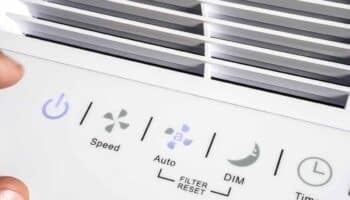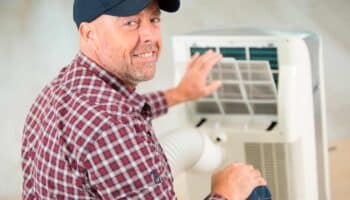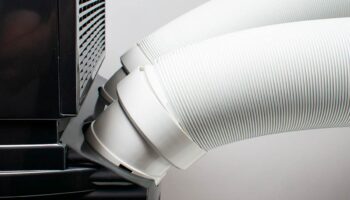We've independently reviewed this article to make sure it's as accurate as we can make it.
To find out more about our article creation and review process, check out our editorial guidelines.
Come on. Confess. You didn’t read the manual, did you?
Yes, portable air conditioners create a lot of water. All air conditioners do. However, you typically don’t need to worry too much about the condensate of a central air system, and a window air conditioner is always installed on a slight slant to let the water drain away. But both of them do their business outside.
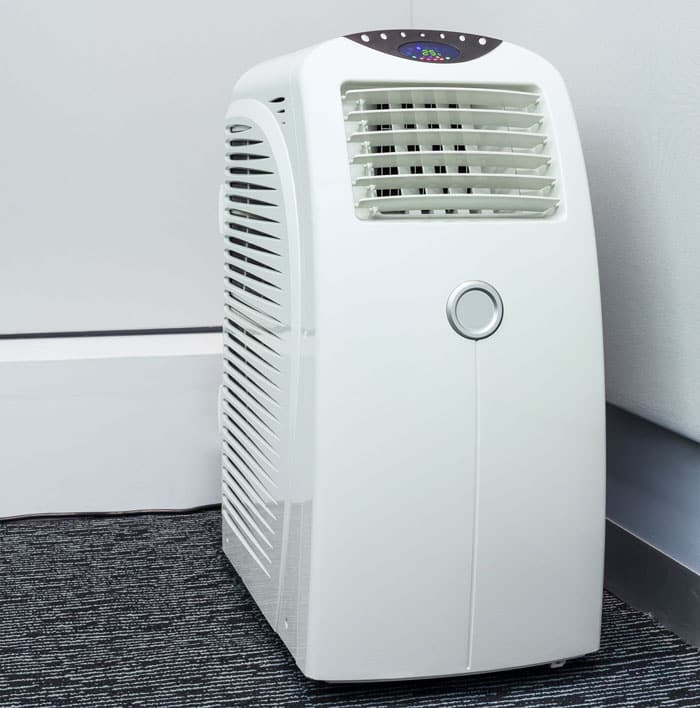
Now you have this portable air conditioner leaking all over and you don’t know why. (Don’t worry – this article will explain everything.)
Your portable AC creates condensate. Just like a dehumidifier, air conditioners remove moisture from the air. The more humid your environment, the more condensate water you need to deal with. There are high-end models that can self- evaporate, but even they need to be drained in some circumstances.
You’ll need to look at your manual to know exactly what’s expected in the case of your model.
Why Your Air Conditioner Creates Water
Your air conditioner is just something that blows cool air into your home, right?
Yes, but there is a process behind its ability to do that. What’s actually happening is heat and humidity are being pulled out of the air first, and then cool air is blown back in.
The refrigerant in your portable air conditioner absorbs and then releases the heat, but moisture is handled by the evaporator coil.
The evaporator coil condenses the water vapor found in the air by pulling the warm air in your home over it. When the warm air connects with the cold coil, moisture is pulled from the air and into the draining system. In some cases that will be a bucket, or it may be via a condensate pump.
If you’re portable AC doesn’t have a pump, there’s more on that later.
The amount of water that gets pulled from the air is due to a variety of situations.
Why Your Portable Air Conditioner Needs to be Drained so Often
In normal circumstances, it’s quite usual for a portable air conditioner to require draining every eight hours or so. However, the environment in your area will impact this. If you live in a dry area, you’re rarely going to need to drain your unit.
In other cases, you may find your portable AC filling Up with water faster than it should. Possible causes are . . .
- High humidity
- Dirty filter
- Faulty or damaged condensate pump
- Poorly sealed home
High Humidity
The most common reason for excess water is high humidity.
| Internal Humidity | A lot of things generate humidity in the home. Cooking, showering, doing laundry, even breathing—you and your pets—can raise the humidity in your home. |
| External Humidity | Unless you live in a perfectly sealed home, humidity from the outside is infiltrating. This adds to the internal humidity your AC is already dealing with. |
Producing water is a normal function of your AC, but if you feel there’s an excess of water, you might want to investigate the cause behind it.
Dirty Filter
When it comes to problems with your home’s heating and cooling, dirty filters are so often the culprit.
In the case of your portable AC, the same applies. Your portable air conditioner has an air filter, and cooled air passes through it before being released into your home. This filter picks up any debris from the air, so it must be cleaned or replaced regularly.
It’s a great idea to regularly replace your air conditioner’s filter. This can be once every couple of months in summer, but more often if you have pets, carpet, and anything that might
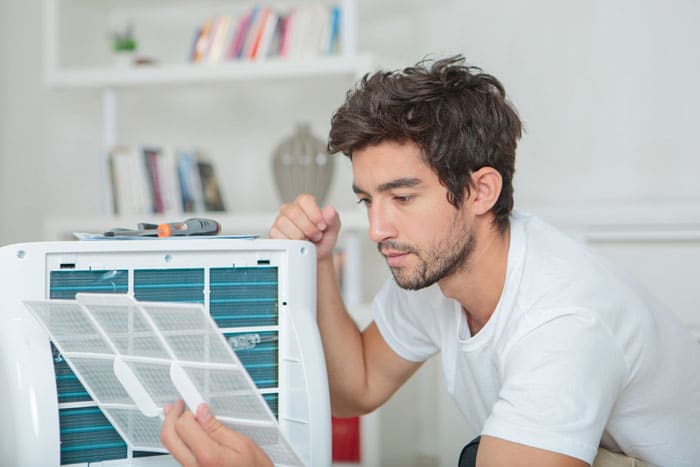
If you fail to clean or replace your filter it becomes clogged, blocking air from being released on the air conditioner. Reduced airflow means less air passes over the evaporator coil.
Eventually, the evaporator coil will begin to freeze up, causing moisture in the air to drip into the condensate pan. No matter what kind of portable air conditioner you have, the rate at which water should be evaporated and exhausted will not be able to keep up. This will result in you having to empty your portable AC unit more often.
Some portable air conditioners, such as Frigidaire models, have a filter reset light. This feature is a reminder that it’s time to clean your air filter. After 250 hours of operation, an LED light will illuminate to alert you. After a filter has changed and the air conditioner plugged back in, simply press the filter reset button to start the cycle over again.
Note that in most cases portable air conditioners have reusable air filters, so it’s not a situation where you need to buy a replacement. Simply wash them with a gentle soap in lukewarm water.
Damaged Condensate Pump
Not all portable air conditioners come with a condensate pump. Typically, these are best for areas that have high humidity, since they will automatically drain the water that collects while in operation.
If your pump is damaged or faulty, it’s not doing its job, and you may have a situation where excess water has collected and is now leaking.
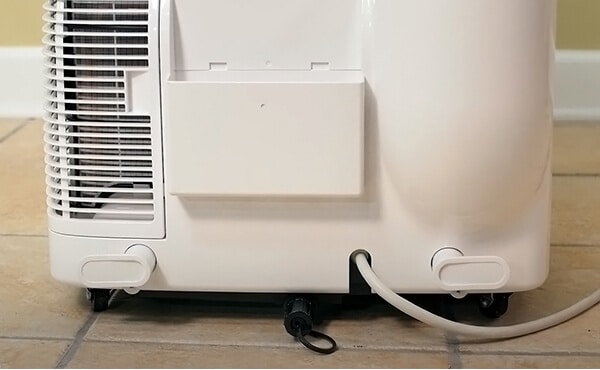
If this is your situation check to see that the drain hose is installed properly. Make sure that the connection to the unit is in place and that water is exiting the hose as it should.
If your pump is faulty and not pushing water up against gravity as it should, water may back up and ultimately leak.
What is a Condensate Pump?
As mentioned above, a few portable air conditioners have an included pump.
For those of you who don’t know what a condensate pump is, or if you’re sick of emptying a bucket of water a few times a day, or your air conditioner is too far from a floor drain, you’ll want to know about this.
Here’s a YouTube video explaining what they are and how they work.
If you’re not in a basement apartment, or you’re using your AC in the basement of your home for whatever reason, you probably have access to a floor drain and can run a hose to it.
In any other circumstance, a condensate pump is a great alternative.
Portable AC Drain Types
Depending on your model, there are different features available.
Exhaust System
Some portable air conditioners will have a condensation exhaust system that will expel water vapor back into the air.
These are great if you live in a dryer climate, but for those living in humid areas, you’ll still need to drain water, either manually or automatically.
Condensate Pump
The next option, mentioned in detail above, is to add a condensate pump, assuming your model doesn’t have an integrated one.
Manual Drain
In this case, you’ll need to use the drain spout. You can either attach a hose and have it flow water directly to a drain or position some kind of container directly below the spout.
Whatever kind of container you decide to drain into, remember it needs to be emptied. And emptied often if you live in a humid place. Small containers will be easy to lift, but you could be doing it every hour. Larger containers will mean you can leave it longer, but it also means you need to be sure you can lift it when full without hurting yourself or dropping it.
Lastly, you can look to YouTube for creative ideas such as this one.
Conclusion
Every air conditioner creates water since that’s the science behind the way they operate. Heat and humidity are pulled from the air in your home.
The refrigerant in your unit deals with the heat, but the humidity is condensed into water that must be drained. The more humid your environment, the more water you’ll need to deal with.
In my opinion, if you have a portable AC that doesn’t have a condensate pump, you need to buy one to add to your system. Assuming you have somewhere close by where you can have it drain.
I hope this helps and has given you some ideas on how to deal with all that water.
While you’re here, why not check out our related posts below?





